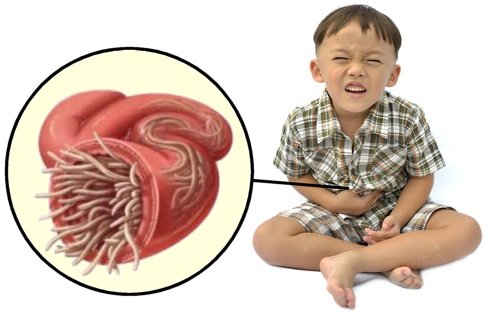Intestinal worms, also known as parasitic worms, are one of the main types of intestinal parasites. Common types of intestinal worms include:
- flatworms, which include tapeworms and flukes
- roundworms, which cause ascariasis, pinworm, and hookworm infections
Pinworm infection occurs most often in school-age children, and the tiny (microscopic) eggs are easily spread from child to child. Treatment involves oral drugs that kill pinworms and thorough washing of pajamas, bedding, and underwear. For best results, the entire family should be treated.
Signs and symptoms:
- diarrhea, nausea, or vomiting
- gas/bloating
- feeling tired
- pale complexion
- the child is not eating properly
- unexplained weight loss or failure to thrive
- abdominal pain or tenderness
- passing a worm in your stool
- dysentery, which is when an intestinal infection causes diarrhea with blood and mucus in the stool
- rash or itching around the rectum
- Insomnia, irritability, teeth grinding, and restlessness
- Often, they may cause no symptoms at all
When to see a doctor?
If you have tried a deworming treatment for your child at home and their symptoms have not improved, take them to a doctor. The doctor will examine your child and may want to do blood or stool tests. Also take your child to the health care provider if:
- they have abdominal pain, nausea, vomiting, or low energy levels.
- your child passes a large worm
بچوں میں آنتوں کے کیڑے:
آنتوں کے کیڑوں کی کئی اقسام ہیں جن میں مندرجہ ذیل عام اقسام شامل ہیں:
- فلیٹ کیڑے ، جس میں ٹیپ ورم اور فلوکس شامل ہیں۔
-گول کیڑے ، جو آسکاریس ، پن ورم ، اور ہک ورم کے انفیکشن کا سبب بنتے ہیں۔
پن ورم کا انفیکشن اکثر اسکول جانے والی عمر کے بچوں میں ہوتا ہے ، اور چھوٹے (جنہیں آپ خوردبین سے دیکھ سکتےہیں) انڈے آسانی سے ایک بچے سے دوسرے بچے میں پھیل جاتے ہیں۔ علاج میں سیرپ یا کھانے والی ادویات شامل ہوتی ہیں جو پن ورم کو مار دیتی ہیں۔ ان کے بعد پاجامہ ، بستر اور دیگر کپڑوں کو اچھی طرح دھونا بھی ضروری ہے۔ بہترین نتائج کے لیے پورے خاندان کا علاج ایک ساتھ کیا جانا چاہیے۔
نشانات و علامات
- ڈائیریا ، متلی ، یا قے
- گیس، پیٹ کا پھول جانا
- تھکاوٹ محسوس کرنا
- پیلی رنگت
- بچہ ٹھیک سے نہیں کھا رہا
- غیر ارادی طور پر وزن میں کمی یا نشوونما میں کمی۔
- پیٹ میں درد
- آپ کے پاخانہ میں کیڑا نکل انا۔
- پیچش ، جو اس وقت ہوتی ہے جب آنتوں کا انفیکشن پاخانہ میں خون اور بلغم کے ساتھ ڈائیریا کا سبب بنتا ہے۔
پاخانے والی جگہ کے گرد خارش یا چبھن۔
- بے خوابی ، چڑچڑاپن ، دانت پیسنا اور بےچینی۔
اکثر ، کوئی علامات نہیں بھی ہو سکتی۔
ڈاکٹر سے کب ملنا ہے۔
اگر آپ نے اپنے بچے کے لیے گھر میں کیڑے مارنے کے علاج کی کوشش کی ہے اور ان کے علامات بہتر نہیں ہوئے ہیں تو انہیں ڈاکٹر کے پاس لے جائیں۔ ڈاکٹر آپ کے بچے کا معائنہ کرے گا اور خون یا سٹول ٹیسٹ کرانا چاہے گا۔ اپنے بچے کو معالج کے پاس ان صورتوں میں بھی لے جائیں اگر:
- آپ کے بچے کے پاخانے میں سے ایک بڑا کیڑا نکلتا ہے۔
- انہیں پیٹ میں درد ، متلی ، قے یا کم توانائی کی شکایت ہو
Doctors to consult (Paediatrician):
Dr Aaqib Javed, Dr Arslan Asif, Dr. Haris Ahmed
Note: Click the Doctor's name to make an appointment.
Reference:
https://www.mountsinai.org/health-library/condition/intestinal-parasites
https://www.rch.org.au/kidsinfo/fact_sheets/Threadworms

